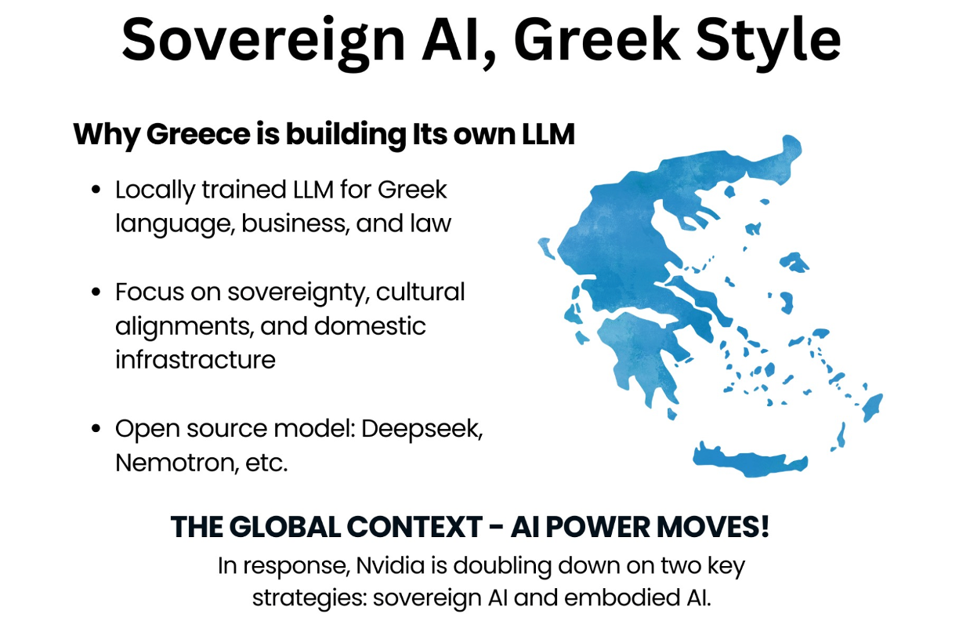
A company called Kiefer is embarking on a big challenge: creating an LLM model application specifically for the nation of Greece, an island state with around 10.5 million people, and an old-world place by American standards, at least. Regardless, the whole world is moving into the future — quickly — and according to technologists like Christos, who spoke to me and others recently about the effort, Greece needs its own model.
He mentioned a goal that motivates the team: to establish dominance with specific market needs, where linguistic and cultural targeting provides advantages.
“Greek models have superior performance applications with deep understanding of Greek languages, cultural context, and local businesses,” he said, “because all of our data is based on Greece.”
To be sure, it’s a tough job.
“We face a lot of issues because of all of the data,” he said. “It's mostly (in) books that we need to scan and everything that exists on the Internet. It's all Pdfs that you need to curate to extract the data, and after that, to be able to train the model.”
There are also headwinds to adoption: Christos cited roughly 9% buy-in, with lower numbers in the government and public sectors.

In responding to questions about architecture, Christos said the project uses three different models including one from DeepSeek, which he said was chosen partly because of accuracy, and partly because the model is open source.
As for other models, he mentioned Nemotron, and a demo from Google, along with interest in Minimax.
Right now, the service is free. But Christos said there’s a plan for subscription pricing in the future.
“After we make some implementation (in terms of modalities like) video, we’ll start to have a subscription fee per month, which would be lower than the big companies,” he said.
Part of that, he added, is to cover costs, like the use of Nvidia hardware.
As for the fundamental task, he talked about following the whiplash trends that crop up as innovators stay on the pulse of AI developments.
“It's always something new,” he said. “We always try to follow the new things in AI. But … if you have a basic structure, for example, if you create your own data, you can follow (best practices) in order to be able for every country, for every person, for every company to create a specific model. It's the data.”
He also mentioned the value of iterative research in fine-tuning.
“Because we have already found a specific procedure about how (to do this), it's more easy to implement and to train the next one,” he said. “We learn from our mistakes, and we win, in time.”
There was also an extended discussion on sovereign AI centering around this principle: if those pursuing this kind of national model use the power of international research, can they build stronger, more capable services?
The Kiefer team, it seems, is dedicated to building AI systems inside Greece, rather than utilizing outside research assistance – to an extent. While Christopher sounded open to sharing open source data, the overall effort, he suggested, should be kept domestic, for various reasons, including language and culture specific goals, ownership issues, and more.
There’s also the suggestion of future technology:
“Maybe I want to create a humanoid to help me to collect olives in the future,” he said. “That's (one reason) why I say it's very important for every country to have the AI.”
Data Ownership and IP Issues
Christos also indicated that teams are watching the results of IP and data cases like the one with Anthropic, where U.S. judges are ruling on whether authors can sue the company for using book data to train models.
One of the more interesting things that the conversation covered was a Kiefer collab with Unitree for humanoids, using the Nvidia omniverse. Christos didn’t give a lot of detail on this, but suggested that Kiefer wants to use its own CPUs and GPUs, and start construction on its AI data centers soon. The infrastructure, he said, will use liquid cooling.
He also noted a reliance on Nvidia as a vendor.
“It’s not only the GPUs,” he said. “It’s also about software, it’s about libraries.”
The endgame, he said, is an advanced Greek-language model, to be integrated with Greek universities and other participants, using green token tech and sustainable infrastructure.
It’s a fascinating example of how nations take initiative right now, with so many choices to make.
You can try it at www.sophea.ai. Or feel free to spin it to fit the style of the column articles. Looking forward to it.
.png)
.avif)